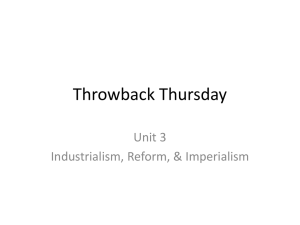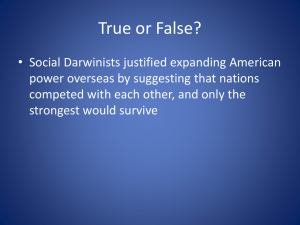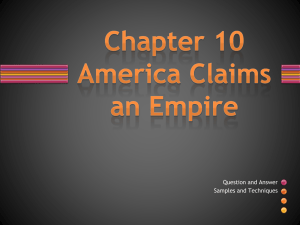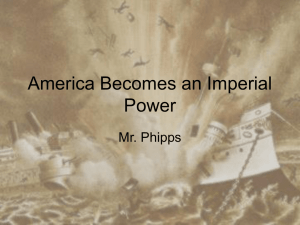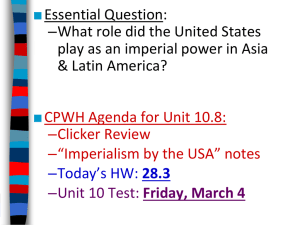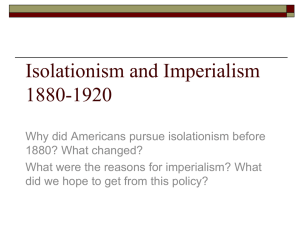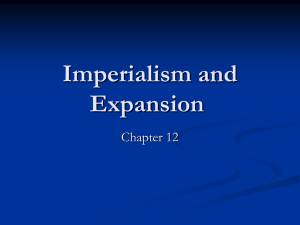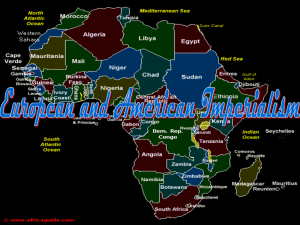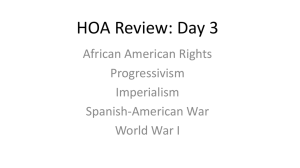Imperialism - West Essex High School
advertisement
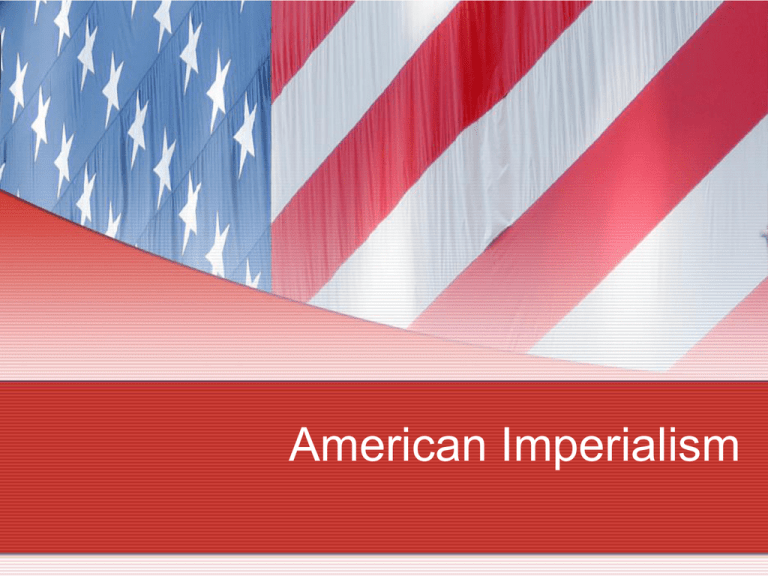
American Imperialism FOREIGN POLICY, 1865-1919 Objective 1 • How did proponents of imperialism justify colonization? • Do Now: List the 3 main reasons imperialists used based on the primary source assignment you were working on the past 2 days. What is imperialism? • The policy by which strong nations extend their political, military, and economic control over weaker territories. • With closing of western frontier, many felt Manifest Destiny still had not been achieved. This, along with increase in population, wealth, and industry, caused many to feel it was time to extend beyond continental U.S. Not a foreign concept… • Imperialism not a new idea. • European nations gathering new colonies in Africa and Asia since mid-1800s. They needed raw materials and natural resources. • Extractive economies: imperial country extracts raw materials from colony and ships them to home country giving them advantage in competition for global resources. • This early expansion had led President Monroe to deliver his Monroe Doctrine in 1823. Reasons for American Imperialism • With closing of western frontier, many felt Manifest Destiny still had not been achieved. This, along with increase in population, wealth, and industry, caused many to feel it was time to extend beyond continental U.S. • Jingoism: extreme nationalism that encourages aggressive foreign policy stance • Desire for military strength • Need to find new markets to sell American goods • Belief in cultural superiority/Social Darwinism Desire for Strong Military: Alfred T. Mahan’s New Navy • U.S. Naval Captain Alfred Thayer Mahan supported overseas expansion in his book The Influence of Sea Power Upon History (1890) • Focused on idea that U.S. needed to build powerful navy to become major world power. • To do this, U.S. would need to occupy sites around world to establish refueling stations and naval bases. • Most logical areas were Hawaii and Cuba • Also advocated building of canal across Isthmus of Panama to provide quick route from Pacific to Atlantic • Explains why focus of early expansion was on Pacific islands and Central America. U.S. Need for Markets • Americans had plethora of natural resources and raw materials. • They were producing more goods than America could buy • Imperialism appealed to them because it would provide new markets to sell their goods. • Experiencing surplus that needed to be sold in order to prevent American factories from closing and unemployment to rise. Belief in Cultural Superiority/Social Darwinism • After successfully removing Native American population from west, seemed natural to remove other native populations overseas from the way of “progress” • Social/cultural superiority and the white man’s burden, Imperialism of righteousness • Moral (Christianity and democracy) and technological improvement of “less civilized” people Objective 2 • Evaluate the economic, political, and social impact the first steps the U.S. took towards world power had on the country. First Steps Towards World Power • 1853: Commodore Matthew Perry sailed fleet of American warships into Tokyo Bay, Japan • Prior to this Japan had denied the rest of the world access to its ports. • Perry negotiated a treaty that opened Japan to trade with America. This set a precedent for further expansion across Pacific Ocean. • 1867: U.S. takes possession of Midway Islands • Treaties in 1875 and 1887 increased trade with Hawaiian Islands and earned right to build naval base at Pearl Harbor. The US & Alaska • 1867-Seward’s Folly/Seward’s Ice Box • Alaska-$7.2 million • 2 cents an acre • Seward’s purchase almost doubled the country’s size and turned out to be rich in timber, oil, and other natural resources. Alaska also greatly expanded America’s reach across Pacific. The US & Hawaii • Hawaiian Islands had been economically linked to U.S. for almost a century • Merchant ships stopped at Hawaii on their way to East Asia, missionaries had established Christian churches and schools, farmers established sugarcane plantations there. • In early 1890s, America planters in Hawaii faced 2 crises. • • New U.S. tariff law imposed duties on Hawaiian sugar that made it more expensive than sugar produced in U.S. Queen Liliuokalani resented increasing power of white planters and abolished the constitution that had given political power to whites in an attempt to expel them from the island • With backing of U.S. officials, American planters, led by Sanford B. Dole, overthrew the queen in 1893. • 1898: President McKinley proclaimed Hawaii an official U.S. territory after outbreak of the Spanish-American war. US Marines in Overthrow of Hawaiian Monarchy Sanford B. Dole Video Overview THE SPANISH-AMERICAN WAR Objective 3 • Evaluate the causes, nature, and effects of the Spanish-American War on the United States. American Interest in Cuba • Americans had moved to Cuba after Civil War to establish large sugar plantations on lush, tropical island Causes of the War • Cubans rebel against Spanish rule • Yellow Journalism inflames opinion • USS Maine blows up Cubans rebel… • Spain controlled Cuba, and Cubans had been growing more and more irritated by presence of foreigners and the fact that they amassed huge fortunes while Cubans worked hard and subsisted from day-today • Insurrectos adopted scorched-earth policy to drive out the Spanish • Spain undertook to crush the rebellion by herding civilians into barbed-wire reconcentration camps where poor conditions caused many to die • Americans could relate to Cubans’ struggle for independence • This provided excellent material for journalists in U.S… Yellow Journalism Inflames Opinion • Yellow journalism: sensationalized stories written for the purpose of selling more newspapers • Competition between William Randolph Hearst (New York Journal) and Joseph Pulitzer (New York World) • Named after popular color comic strip called “Yellow Kid” ran exclusively in Hearst’s paper • Americans heard of the atrocities, real and sensationalized, from popular press and as a result grew increasingly concerned over events in Cuba. • Drove many Americans and Cuban immigrants to support aiding the Cubans in their revolt, however Presidents Cleveland and McKinley did not favor this position and would not consider war an option until U.S. was directly “threatened.” U.S.S Maine Explodes Before • • • After • • 1898-President McKinley ordered the U.S.S. Maine to Cuba • Provide protection and bring home American citizens February 15, 1898 • Maine exploded in Havana harbor • 260+ men were killed U.S. blamed Spain, Spain denied involvement, investigation crew declared submarine mine had sunk the ship Later concluded that it was explosion in coal shaft Pushed President McKinley to declare war, however added Teller Amendment to declaration to assure Cuba and rest of world that US intended to grant Cuba her independence once war ended Remember the Maine Fighting in the Spanish-American War • • • • War officially began on April 11, 1898. The Philippines • Fighting did not begin in Cuba but in Spanish colony of the Philippines. U.S. Naval Commodore George Dewey sent with his fleet to Manila Bay and opened fire on May 1. Naval battle short-lived but land battle more difficult. Many Filipinos fought to oust both the Spanish and the American forces. U.S. able to convince Filipino revolutionary Emilio Aguinaldo to assist in fight against Spanish in exchange for independence after war’s end. As result, American and Filipino fighters were able to take Manila by August. Cuba • Fight in Cuba much more difficult due to tropical diseases and inexperience of American forces. Most American casualties were due to disease, only 10% casualties due to actual combat. Most celebrated American battle was for high ground of San Juan Hill. Theodore Roosevelt and volunteer force of college students, cowboys, and adventurers called the Rough Riders were able to take hill with much assistance from Fourteenth Regiment Colored Cavalry. Puerto Rico • After U.S. claimed victory in Cuba on July 1, it invaded Spanish colony of Puerto Rico. Unable to fight any longer, Spanish signed ceasefire with U.S. in August 1898. http://www.youtube.com/watch?v=IU5l4yQCpMM The US Military in Cuba • Rough Riders • Segregated regiments Treaty of Paris: Territorial Acquisitions • 4 months of war – Spain relinquished: • Cuba* • Puerto Rico • Guam • Philippines • US began imperialistic foreign policy that caused them many problems. • Americans did not all agree on expansionist policies Controversy: What do we do with the Philippines? • President McKinley between rock and a hard place: • He could give the Philippines their independence as promised and risk either the possibility of radical dictator taking over islands or European power taking control OR • He could take the islands and face the court of world opinions. • Decided that U.S. would take Philippines and deal with independence issue at later date • Led to intense guerilla warfare • Filipinos under leadership of once-American ally Aguinaldo, broke out into revolt against American presence. Horrible guerilla warfare broke out between Filipino revolutionaries and Americans in jungles of islands in 1899. Aguinaldo and his fighters were finally subdued by U.S. in 1901, when leader was captured. Philippines did not gain their independence until 1946. Cuba after the war… • As Cuba set to draft its constitution, U.S. grew unsure of Teller Amendment and its promise to give Cuba independence with no strings attached. • Issued the Platt Amendment in 1902, which Cubans would have to write into their Constitution to gain freedom. • Made Cuba a protectorate of the U.S. • Cuba had to have all treaties approved by U.S. before signing • U.S. had right to interfere in Cuban political and military affairs • U.S. would be given access to naval bases on the island • In essence, Cubans had not gained their independence at all. Part 3 America as a World Power The Panama Canal • U.S. had interests in Caribbean and Pacific and wanted to cut down travel time between the seas (traveling around South America took several weeks) • 1901: U.S. tried to negotiate treaty with Columbia but Columbia didn’t accept the terms • Panamanians revolted against Columbia • Head of revolution met privately with TR to plan • November 2: U.S. gunboat arrives in Panama and following day Panamanians begin their rebellion • U.S. marines prevented Columbian forces from reaching the rebels • Rebels set up new govt. and declared Panama an independent nation; U.S. recognized Panama and negotiated new canal treaty • Hay-Bunau-Varilla Treaty: gave U.S. complete and unending control over 10-mile wide Canal Zone. • Construction of Canal began in 1904 and was completed in 1914 Panama Canal How the locks system works... The Panafdgfdgfdgdfgma Canal • The Panama Canal…click link below • http://www.youtube.com/watch?v=hoQ7R HyG-EA The Roosevelt Corollary • President Roosevelt growing increasingly concerned over problems with nation of Venezuela and attempts by Britain and Germany to collect debts from country • Amended Monroe Doctrine by adding the Roosevelt Corollary, which stated that U.S. would come to aid of any Latin American nation experiencing financial trouble. • In essence, U.S. became police officer of Latin America • This changes relations abroad • U.S. used force to protect the Dominican Republic and Cuba from political chaos The U.S. and China • China was another area of concern for Americans, especially investors. • Japan and other European nations had already carved up “spheres of influence” in China • Regions where a particular country has exclusive rights over mines, railroads, and trade. • Wanting in on the action, Secretary of State John Hay issued his solution, the Open Door Policy in 1899 • China and her surrounding regions would be open and free to trade with any nation • Received cold shoulder abroad • China did not like the influence that westerners were having on their country • 1900, young group of Chinese nationalists revolted against Open Door Policy and foreign intervention in Boxer Rebellion • Killed more than 200 whites and attacked foreign settlement in Beijing. • Sought to remove all foreigners from China by force • Multinational force, including U.S. forces, sent to Peking to end rebellion The U.S. and Japan • The Russo-Japanese War • War broke out between Russia and Japan in 1904 over land in China, Korea, and Manchuria. Japan was first serious military setback to European power by nonEuropean force since 1500s. But Japan began to run short of men and yen and asked TR in secret to help sponsor peace negotiations. • TR did not want either nation to win control over the region • TR guided warring parties to settlement (Treaty of Portsmouth) that ended war but satisfied neither and ruined U.S. friendships with two foreign countries. • Russians accused Roosevelt of robbing them of military victory • Japanese felt cheated out of its due compensation and Japan and U.S. now became rivals in Asia as fear and jealousy between them grew. • The Gentleman’s Agreement • War in Japan caused new wave of Japanese immigrants to come to California, angering white Californians. • 1906: San Francisco school board tried to segregate schools which angered the Japanese • TR invited school board to Washington and got them to agree to repeal offensive school order if Tokyo agreed to stop the flow of laborers to the American mainland by withholding passports. • The Great White Fleet • TR did not want Japanese to think that U.S. had given in to wishes as show of weakness, so he sent the U.S. navy around the world as a show of power. • From this point on, relations with Japan were strained. Imperialistic Presidents • Theodore Roosevelt: Big Stick Diplomacy • William Howard Taft: Dollar Diplomacy • Encouraged Wall Street investors to send their dollars to foreign countries to weaken European bonds and strengthen ties with U.S. • However, when these American investments were endangered, sent U.S. forces to protect American investments. • Woodrow Wilson: Moral Diplomacy • Believed imperialism was immoral, but believed in superiority of American democracy and thought it was his duty to spread that ideal to protect nations under threats of totalitarianism • Wilson invaded Nicaragua and Dominican Republic and purchased Virgin Islands Anti-Imperialism • Reasons • Moral • Political • Racial • Economic • William Jennings Bryan speech Crash Course American History • American Imperialism
